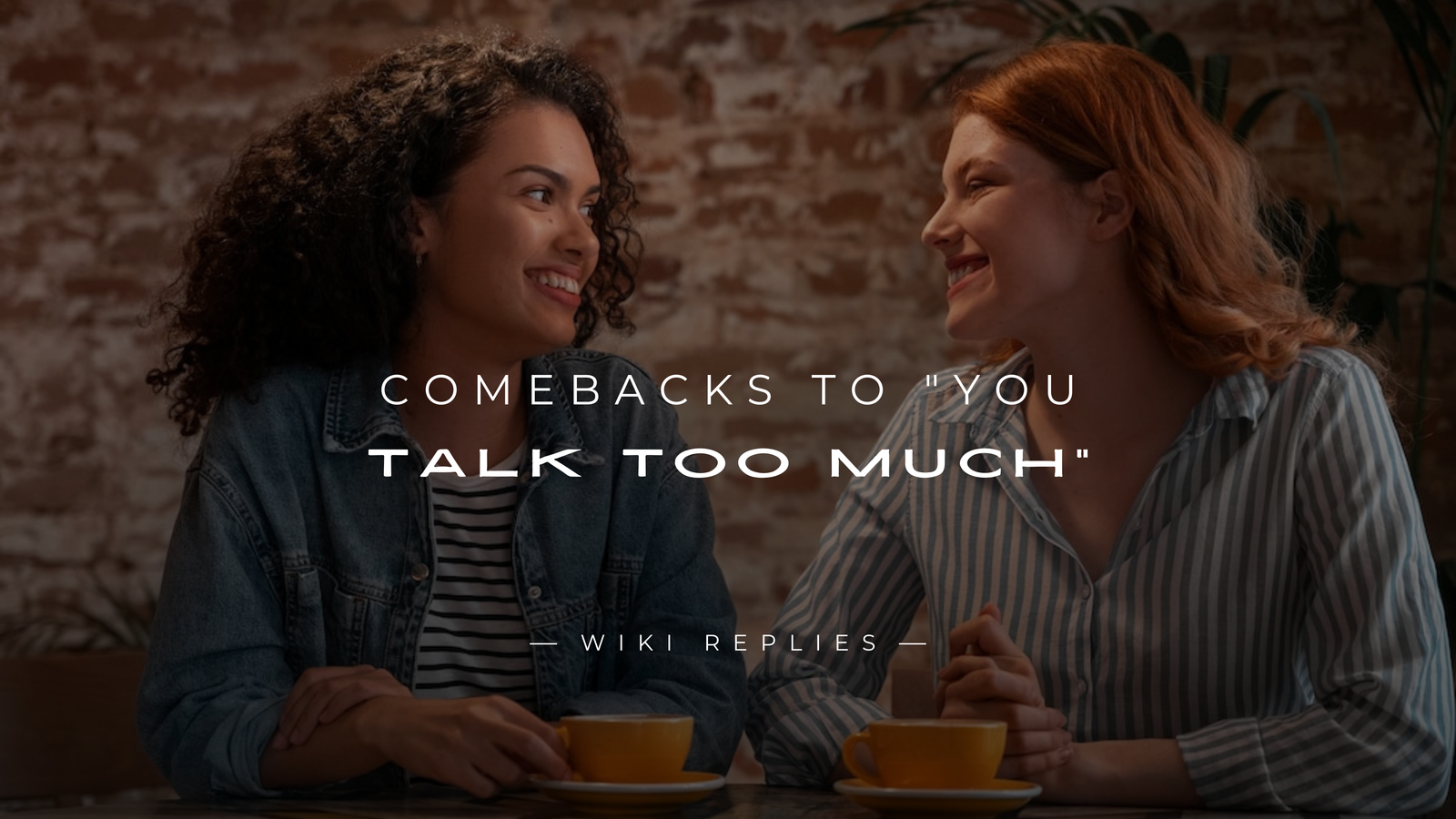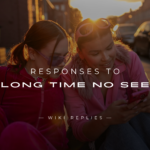Imagine you’re in the middle of telling a story or sharing your opinion, and someone abruptly cuts you off with a smirk or an eye roll and says, “You talk too much.” That single sentence can stop you in your tracks. It can make your cheeks flush, your heart pound, and leave you wondering if you’ve just made a fool of yourself.
Sound familiar? You’re not alone.
It’s one of those seemingly casual comments that can hit harder than it appears on the surface. Whether it comes from a coworker, a friend, a partner, or even a stranger, hearing someone say, “You talk too much” can feel like they’re judging your personality. Your words are a part of who you are, so when someone criticizes how much you talk, it often feels like they’re criticizing you as a person.
But here’s the thing. Talking isn’t a bad thing. It’s how we connect, share ideas, make people laugh, and build relationships. Your voice matters, and you deserve to be heard. In this article, we’re going to unpack why this phrase can be so hurtful, how to recognize the intent behind it, and most importantly, how to respond with humor, confidence, or grace depending on the situation. Whether you want to shut it down with a witty comeback or rise above it with maturity, we’ve got you covered.

220+ Comebacks to “You Talk Too Much”
Sarcastic
- Oh no, someone alert the word police.
- You’re right, next time I’ll just mime my personality.
- Sorry, I didn’t realize my voice was such a national emergency.
- Wow, thanks for the diagnosis, Dr. Silence.
- Let me guess, you’re a certified expert in shutting people down?
- Maybe you’re just not used to interesting conversations.
- I’ll try to compress my thoughts to fit your attention span.
- My bad, I forgot you prefer the sound of crickets.
- Guess I’ll go back to my silent monk training.
- Oh no, is it interfering with your thinking time?
Witty
- I talk a lot because I’m filled with good content.
- Better a talker than someone who sits there like a houseplant.
- Some people use words, others use awkward silence.
- My voice has range, unlike your responses.
- It’s not talking too much, it’s called verbal charisma.
- Talking a lot is just my way of filtering out the boring.
- At least I come with commentary, not buffering.
- I’m basically an audiobook with better pacing.
- Words are free, and I’m generous.
- I’m not talkative, I’m feature-rich.
Icy Cool
- You don’t have to listen, it’s not mandatory.
- Noted. Still going to keep talking though.
- You seem oddly invested for someone so bothered.
- If it’s a problem, feel free to walk away.
- That sounds like a you issue.
- I’ll be over here, vibing with my own dialogue.
- Silence is overrated anyway.
- I like hearing myself. Thankfully, I’m not alone.
- Talking is my peace. You don’t have to attend the concert.
- You’re welcome to exit my broadcast.
Playfully Mocking
- Sorry, did I interrupt your daily moment of nothing?
- Oh no, am I threatening your record of quietest person alive?
- You poor thing, forced to hear someone actually speak.
- Want me to draw you a picture instead?
- I could say less, but then you’d miss my best material.
- Let me slow down so you can keep up.
- You should thank me. I’m adding color to your grayscale life.
- Aww, you sound jealous of my air time.
- You talk so little, someone has to balance the scales.
- I talk, you blink. Perfect partnership.
Intellectual
- Communication is essential to mutual understanding.
- Silence has its place, but so does insight.
- Expressing thought shouldn’t be mistaken for excess.
- If verbosity is the price of clarity, I’ll pay it gladly.
- Dialogue is a cornerstone of human progress.
- You call it talking too much, I call it cognitive output.
- Perhaps it’s not quantity, but your inability to keep up.
- Would you prefer I limit expression for your comfort?
- Complex thoughts rarely fit in short sound bites.
- If you listen, you might learn something new.
Reverse Uno
- Funny, I was just thinking that about you… being too quiet.
- You notice how much I talk but not how little you contribute?
- Says the person who’s been giving me commentary on my commentary.
- I talk too much? You interrupt even more.
- Maybe I talk a lot because you never do.
- I fill the silence you leave hanging.
- If I stopped, would you even notice or just start talking about me again?
- You say that every time I say something interesting.
- You sure spend a lot of time around me for someone who minds it.
- If I talk too much, you listen too long.
Confident/Alpha
- People love hearing me talk. You’re just not the target audience.
- I talk a lot because I have things worth saying.
- I lead. Talking comes with the job.
- I don’t apologize for having a voice.
- I’m not loud, I’m just clear.
- The room gets quiet when I speak. That says something.
- I don’t shrink to make others comfortable.
- Better to talk too much than be ignored.
- You think it’s too much, others call it presence.
- My words move people. Your silence… not so much.
Dramatic Flair
- And lo, the voice of reason rose once again.
- I speak not to be heard, but to be felt.
- Each word I utter is a gift. Don’t squander it.
- Silence may be golden, but my words are platinum.
- This monologue was brought to you by sheer brilliance.
- I was born to narrate life itself.
- Apologies, I didn’t realize I was performing for critics.
- My mouth is a fountain, and you, dear listener, are parched.
- Talking too much? Nay, I am merely ahead of my time.
- If words were art, I’d be a masterpiece in motion.
Philosophical
- Who decides how much is too much?
- If I speak, I exist more vividly.
- Conversation is how we connect to the world.
- To express is to live beyond oneself.
- Is a river blamed for flowing?
- Maybe I talk because silence never asked me a question.
- Words build bridges, silence builds walls.
- Talking is the mind’s way of reaching out.
- What if talking is just my soul reaching for meaning?
- My words are echoes of thought trying to be understood.
Deflecting Humor
- It’s either talk too much or dance in public. Choose wisely.
- I’m like a podcast that never ends.
- I was raised by parrots. Explains a lot.
- My mouth moves faster than my brain. It’s a feature.
- I talk so much, even my echo gets annoyed.
- I’m practicing for my one-person talk show.
- I have unlimited talk time. No one warned you?
- At least I’m not humming the same three songs all day.
- Talking is cheaper than therapy.
- If silence is golden, I’m clearly broke.
Reflective
- Maybe I talk a lot because no one really listens.
- I’ve always felt silence leaves too much room for overthinking.
- Sometimes talking helps me process the chaos in my head.
- I didn’t realize my words took up so much space in your world.
- Maybe it’s my way of filling empty rooms and awkward energy.
- I talk because I spent too long feeling invisible.
- Words help me feel like I exist.
- At least when I talk, I feel like I’m connecting.
- I guess I’d rather overshare than stay unheard.
- You might see chatter, but for me it’s comfort.
Snappy & Petty
- And yet, here you are, still not leaving.
- I talk too much and you whine too easily.
- Sorry, I didn’t realize I needed your permission to speak.
- I’ll stop when you start making sense.
- You must be exhausted, keeping up with all my greatness.
- At least I don’t waste my words being petty.
- I talk too much, and you’re still the most annoying voice in the room.
- I’m talkative, you’re forgettable. Balance.
- You’re just mad my words have more presence than your silence.
- You complain like it’s a talent. Congrats.
Self-Deprecating
- Yeah, my mouth has no off switch. Even I wish it did.
- I talk too much and still manage to say nothing important.
- Honestly, I’m surprised you’re still listening. I would’ve zoned out by now.
- I’m like a broken faucet, just dripping words.
- It’s a gift. And a curse. Mostly a curse.
- I talk to distract myself from how awkward I am.
- Don’t worry, I annoy myself too.
- I just figured if I stop talking, the awkward silence might say something worse.
- My brain doesn’t know when to shut up either.
- I talk too much. It’s in my skillset, right next to overthinking.
Savage
- I talk too much? You bring nothing to the table but complaints.
- Sorry, didn’t realize this was a library and you were the head shusher.
- I speak facts. You should try it sometime.
- I’m the voice of the room. You’re just background noise.
- Funny how the most boring people always hate energy.
- I could talk less, but then who would keep the room alive?
- At least I don’t waste silence pretending to be deep.
- I talk because you never say anything worth echoing.
- I talk too much, and I’m still more tolerable than your attitude.
- You don’t like my words because they don’t praise your silence.
Ghosting Energy
- Cool. I’ll make sure not to waste more words on you.
- Got it. I’ll save my breath for people who matter.
- Thanks for letting me know. I’ll go be entertaining elsewhere.
- Consider this the last conversation we’ll have.
- Don’t worry, you won’t have to hear from me again.
- If that’s how you feel, I’ll stop giving you free attention.
- Silence? You got it. Permanently.
- I’ll go ahead and redirect this personality elsewhere.
- Now you’ll get exactly what you asked for: nothing.
- Say less? I will. Especially to you.
Childish Comeback (Silly)
- I talk a lot because I’m awesome and the world needs to hear it.
- Takes one to no-talk one.
- Sorry, I can’t hear you over how amazing I sound.
- My voice has a life of its own. Blame it, not me.
- I’m not talking too much, I’m giving a live performance.
- I’m practicing for when I’m famous.
- I’m not annoying, I’m energy-efficient entertainment.
- You should be paying for this much personality.
- Mute me if you can, but I’ll just respawn louder.
- I come with sound effects, deal with it.
Minimalist Comeback
- And?
- Cool story.
- Noted.
- Still gonna talk.
- K.
- Thanks for the feedback.
- Cry about it.
- That’s wild.
- Sounds like a you problem.
- Mm-hmm.
Nerdy Reference
- I’m like C-3PO, fluent in over 6 million ways to annoy you.
- This is just my pre-boss-battle monologue.
- Sorry, I’m in NPC dialogue mode today.
- My charisma stat is maxed out, I can’t help it.
- I talk too much because I was bitten by a radioactive podcast.
- My Hogwarts house is “Won’t Shut Up.”
- I’m basically a human quest log.
- My speech skill is at 100. Yours clearly isn’t.
- I’m not talking, I’m narrating the lore.
- I talk like Deadpool, minus the swords… for now.
Corporate Professional
- Thank you, I’ll take that as engagement feedback.
- Noted. We’ll circle back to that during silence hour.
- I’ll flag that concern for next quarter’s behavior audit.
- Let’s table the critique and stay on task.
- If you prefer silence, may I suggest an empty conference room?
- I communicate proactively. It’s called leadership.
- Talking a lot is how I align on goals.
- I’ll be sure to schedule a moment of quiet on your calendar.
- That’s fair. Let’s discuss it during our performance review.
- Noted for personal development. Moving on.
Exit Line
- I talk too much? Cool, I’ll go talk somewhere more appreciated.
- That’s my cue to find better company.
- I’ll save my words for people who actually like them.
- Alright, I’ll spare you. Later.
- Wow, fun crowd. I’m out.
- I’ll go narrate somewhere else.
- You don’t like it, you don’t have to stay. Bye.
- I get it. Not everyone can handle greatness.
- Welp, guess that’s my sign to bounce.
- Thanks for the feedback. I’ll take my talent elsewhere.
Deadpan
- Fascinating observation. Truly groundbreaking.
- Your concern has been filed under irrelevant.
- Still not the worst thing I’ve been accused of today.
- Incredible. You’ve cracked the code.
- Noted. Now watch me keep doing it.
- And yet, here you are, still listening.
- Talking is free. Judging is cheap.
- Thank you for that emotionally flat announcement.
- Cool. Anyway.
- This just in. I still don’t care.
Mock Analysis
- According to my internal metrics, engagement levels are actually peaking.
- I ran a focus group. Turns out people love it.
- My word output is statistically aligned with global averages.
- Your feedback has been logged and promptly ignored.
- Based on user analytics, you are in the minority.
- That’s interesting. The algorithm says I should keep talking.
- My data team recommends I increase volume, not reduce it.
- If I silence myself now, retention drops by 87 percent.
- Your silence hasn’t tested well in A/B trials.
- Survey results show your opinion is marked as irrelevant noise.
Boomerang
- I talk too much? You complain too much.
- Says the person who’s still standing here listening.
- And yet, you never miss a chance to comment on it.
- Funny. You’re always around to hear it.
- Maybe if you talked more, I wouldn’t have to.
- I talk too much because you leave so much silence to fill.
- I learned it from watching you.
- You’ve said that before. Ironically, a lot.
- I keep talking. You keep listening. Who’s really the problem?
- If I’m loud, you’re clearly tuned in.
Meta/Humorous Acknowledgement
- I know. I even narrate my dreams out loud.
- This is actually me holding back.
- My brain has a live-stream setting. I forgot to turn it off.
- Yeah, I talk like I’m paid per word.
- I’m basically a podcast with legs.
- You should hear the director’s cut of this conversation.
- My internal monologue escaped years ago.
- I’m self-aware. Just not self-muted.
- At least I keep things interesting. Someone has to.
- Trust me, I’m annoyed by my voice too. But here we are.
Strategic Silence (Non-verbal)
- (Stares blankly for five seconds, then raises eyebrows.)
- (Nods slowly. Doesn’t break eye contact.)
- (Pretends to zip mouth, throws away key.)
- (Smiles. Says nothing. Continues smiling.)
- (Slow blink. Looks at imaginary camera.)
- (Finger on lips. Then slowly removes it. Still no words.)
- (Shrugs and gives a thumbs-up.)
- (Pantomimes locking lips. Immediately resumes talking.)
- (Silent peace sign. Walks away.)
- (Mouths “Wow.” Then just walks off.)
Why This Phrase Hurts More Than It Seems
At first glance, “You talk too much” might seem like an innocent or even playful comment. But if you’ve ever been on the receiving end of it, you know it cuts deeper than that. It can make you question your behavior, doubt your social skills, and feel like your enthusiasm or passion is something to be embarrassed about.
This phrase hurts because it attacks a core part of human connection. Talking is how we relate to each other. Being told you do it too much can feel like you’re being told you’re annoying, overbearing, or not self-aware. For those who are naturally expressive, energetic, or chatty, it feels like someone’s asking you to dim your light.
It’s especially painful if it comes from someone close to you, like a partner or friend. In those cases, it can feel like rejection of your personality. Even worse, it might make you feel like you should change who you are to fit someone else’s standards.
When and Where You Might Hear It
“You talk too much” is a phrase that doesn’t need a specific time or place. It can be said in a variety of situations, and sometimes it’s not even said out loud. You might hear it:
During a meeting at work when you’re sharing your thoughts and a colleague interrupts you with that line
While hanging out with friends and you’re excitedly telling a story when someone rolls their eyes and throws the phrase at you like a wet blanket
From a sibling or parent during a family dinner when conversations get long and animated
From a romantic partner who might be overwhelmed or irritated by a long venting session
Even from strangers in a public setting, like in a waiting room or on social media, where people feel emboldened to judge without context
The worst part is that it can come unexpectedly and leave you unsure of how to respond. Do you laugh it off? Say something back? Stay quiet and feel small? The answer depends on who said it, how they said it, and what you want to get out of the situation.
Is It a Joke or a Jab?
Tone and context matter. Sometimes “You talk too much” is said playfully with a smile or a laugh. In that case, the person probably isn’t trying to hurt your feelings. They may be teasing you in a light-hearted way. But other times, the comment is meant to shame you, embarrass you, or shut you down.
So how can you tell the difference?
If the person says it with warmth in their voice, makes eye contact, and laughs with you instead of at you, it’s probably harmless teasing. However, if their tone is flat or irritated, if they interrupt you mid-sentence, or if they say it in front of others to make you look bad, it’s more likely a passive-aggressive jab.
What the Speaker Might Really Be Saying
Often, people don’t say what they truly mean. The phrase “You talk too much” might be a surface-level comment masking something deeper.
- Insecurity Projection
Believe it or not, someone might criticize your talking because they’re uncomfortable with your confidence. If you’re outgoing, opinionated, or passionate, they might feel overshadowed. Instead of acknowledging their own insecurity, they lash out at you with a subtle insult. It’s not really about you. It’s about how they feel around you.
- Miscommunication or Misjudgment
Some people just have different communication styles. Introverts or people who prefer quiet might feel overwhelmed in loud or fast-paced conversations. What they interpret as “too much talking” might actually be normal in other circles. In this case, they’re not necessarily trying to hurt you. They’re just expressing discomfort in a way that lacks tact.
Understanding the true meaning behind the phrase helps you respond in a way that fits the situation.
Staying Calm Before You Clap Back
- Breathe First, React Second
Your first instinct might be to clap back immediately. Maybe you want to defend yourself or hit them with a snappy comeback. That’s understandable. But before you respond, take a breath. Pause for a moment. Collect your thoughts. A pause not only helps you calm down, but it can also throw the other person off. It shows confidence and gives you control over the interaction.
- Don’t Let It Get Under Your Skin
Remember, one person’s opinion doesn’t define you. If someone says you talk too much, it doesn’t mean you actually do. Maybe you’re just more expressive than they are. Maybe you’re more passionate, more curious, or more social. That’s not a flaw. Don’t let one comment make you feel like you need to shrink yourself to fit someone else’s comfort zone.
Funny Comebacks to “You Talk Too Much”
Humor is a powerful tool. A well-placed joke can diffuse tension, disarm a critic, and even turn the moment in your favor. If you’re comfortable with light banter, these funny comebacks can keep things playful while making your point.
“I know. I should probably start charging admission.”
“I like to make sure no one falls asleep. You’re welcome.”
“It’s part of my charm. Some people just sparkle louder.”
“I talk a lot, but at least I’m not boring.”
“You’d miss me if I stopped. Admit it.”
These kinds of responses are perfect when the comment comes from someone who’s teasing, or when you want to keep the mood light without letting the comment slide.
Savage Comebacks That Shut It Down
If the comment was meant to hurt you or make you feel small, and you’re not in the mood to laugh it off, you have every right to defend yourself with a little heat. These comebacks are sharp, assertive, and unapologetically bold.
“I talk a lot because I’ve got something to say. What’s your excuse?”
“Maybe if you listened better, you’d hear more than just the volume.”
“Interesting how people always notice the talkers, but never the silent ones judging from the corner.”
“I’d rather be loud and passionate than dull and forgettable.”
“Sorry, I don’t speak in whispers. Try adjusting your sensitivity.”
These responses are best saved for people who are being rude or trying to make you feel embarrassed in front of others. You don’t have to match their energy with cruelty, but you can definitely match it with strength.
Classy and Mature Responses
Sometimes, it’s more effective to respond with grace than sarcasm. Especially in situations where you want to maintain professionalism or protect a relationship, maturity can be your greatest asset.
“I appreciate you sharing that. I’ll be more mindful moving forward.”
“I get excited and sometimes go on too long. Thanks for the reminder.”
“Let me know if I’m overdoing it. I want to make sure everyone has space to speak too.”
“I didn’t mean to dominate the conversation. I’ll pull back a bit.”
These responses show emotional intelligence. They let you acknowledge the feedback without taking it personally, and they often earn respect rather than causing conflict.
Comebacks in Professional Settings
In the workplace, it’s important to choose your words carefully. You want to defend yourself without sounding defensive, and you want to maintain your credibility.
“Thanks for the input. I’ll make sure to keep it concise.”
“I’m passionate about this topic and sometimes get carried away. I’ll work on tightening things up.”
“I value clear communication and I appreciate the reminder to make space for others as well.”
These responses are respectful, but they also affirm that you have every right to participate and express your ideas.
Handling It in Social Situations
Friends and family might say it jokingly, but even jokes can sting if they’re repeated too often. Here are some comebacks that fit casual settings.
“You love it. Don’t act like you don’t.”
“Someone’s jealous of my storytelling skills.”
“I bring the conversation. You’re welcome.”
“Let’s be honest. Without me, this dinner would be silent.”
These are great when you want to keep things light but still stand your ground.
Comebacks for Bullies or Toxic People
If the person saying it has a history of putting you down or belittling you, it’s important to be firm.
“I’m not interested in shrinking myself to make you feel more comfortable.”
“Feel free to walk away if my voice is too much for you.”
“I talk a lot because I care, not because I crave attention. Can you say the same?”
“You’re welcome to leave if it bothers you so much. I won’t miss the negativity.”
When Silence is the Best Response
Sometimes, the best comeback is none at all. Silence can be powerful, especially when the comment doesn’t deserve a response. A raised eyebrow, a confident smile, or simply continuing your conversation can speak louder than words.
Ignoring rude remarks shows that you’re not rattled and that their opinion doesn’t matter enough for you to react.
Tips to Avoid Being Misunderstood as a “Talker”
If you’re genuinely concerned about talking too much, here are a few practical tips to strike a better balance.
Pay attention to nonverbal cues. If people are nodding and smiling, they’re probably enjoying the conversation. But if they’re glancing at their phones or looking around the room, it might be time to wrap it up.
Ask more questions. The best conversationalists don’t just talk. They listen and engage others. Make space for everyone in the conversation to share their thoughts.
How to Build Better Communication Habits
Practice active listening. Focus fully on the person speaking and respond thoughtfully instead of waiting for your turn to talk.
Be mindful of your energy. Sometimes it’s not how much you say, but how you say it. Slow down if you tend to speak quickly or loudly.
Balance enthusiasm with awareness. Being passionate is great, but make sure you’re not overwhelming the moment.
Turning the Insult into a Positive Trait
Being talkative isn’t a flaw. In fact, it can be a huge strength when used well. Talkative people are often great storytellers, leaders, networkers, and teachers. They can bring energy to a room, lift people’s moods, and spark meaningful discussions.
If someone says “You talk too much,” you can proudly say, “Yes, I do. And I use it to build, connect, and inspire.”
Conclusion
Whether you’re shutting down a hater, lightening the mood with humor, or standing your ground with grace, having the right comeback ready makes all the difference. Remember, talking isn’t a flaw it’s often a sign of curiosity, passion, or intelligence. So next time someone throws a “You talk too much” your way, you’ll know exactly how to respond on your terms, and in your tone. And if you’re looking to handle more snarky comments like a pro, don’t miss our ultimate list of 250+ Smart Comebacks to “You’re Not Trying Hard Enough” to keep your reply game strong in every scenario.
FAQs
Q. What if someone constantly says “you talk too much”?
If it happens often, it might be time to set a boundary. Ask them directly why they feel that way, and let them know how their comment affects you.
Q. How do I deal with being self-conscious about talking?
Awareness is the first step. If you’re worried about talking too much, practice balancing your conversations by asking others questions and checking their reactions.
Q. Is it wrong to be talkative?
Absolutely not. Being talkative is a personality trait, not a flaw. It only becomes an issue if it’s unbalanced or inconsiderate of others.
Q. How can I respond to this insult without sounding defensive?
Try using humor or calm acknowledgment. For example, “I do get chatty when I’m excited. Thanks for the heads-up.”
Q. Can being talkative actually help my career or relationships?
Yes. Strong communication skills are essential in leadership, networking, and building emotional connections. If you can harness your gift of gab, it becomes a powerful asset.










